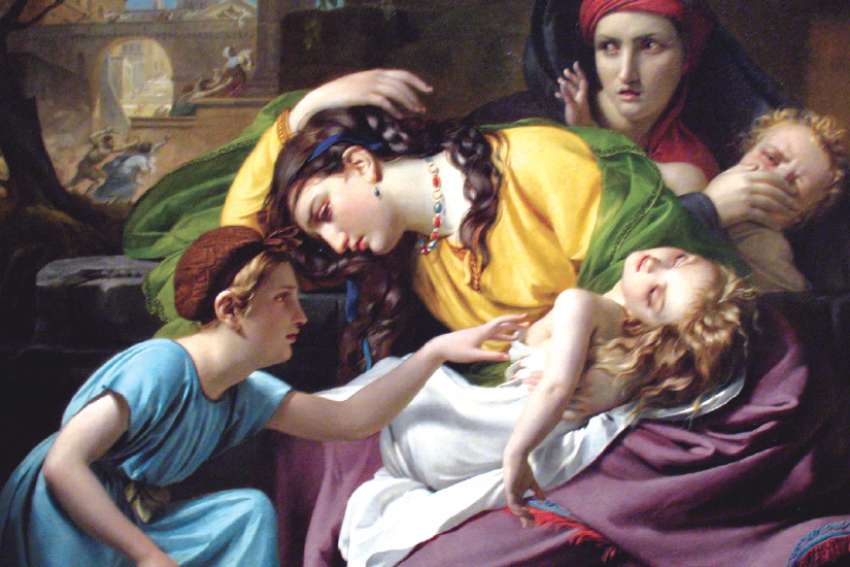It sounds strange to start a Christmas-time reflection with anguished weeping, but let me tell you how this Scripture verse came to life for me. I glimpsed its meaning while at a Project Rachel retreat.
Named for this same Rachel, it’s a retreat for women who experience suffering from having abortions and seek healing, forgiveness and peace.
For the past decade, I’ve helped facilitate Project Rachel retreats regularly. They are unforgettable. The women who come to them are, as Pope John Paul predicted they would be, “promoters of a new way of looking at life.”
At one retreat, I watched one of the volunteers (I’ll call her Eileen) tell her personal story in the confidential setting of our retreat group. She’d found healing and transformation on her own retreat, and came back (as many do) to serve as retreat-team member for others who share this suffering. She courageously invited us all into the “story of a soul,” to use Thérèse Lisieux’s expression. Eileen has done the personal and spiritual work of learning her own narrative as a narrative not only of hurt, shame and suffering, but of love, hope and the intimate presence of God.
As she spoke, she sometimes wept. Often we wept, too. Then, on the edge of her seat, she said to the women on retreat: “And we need to show you — we, who have come through this at such cost and been given such grace, need to tell you about it. We’ve been where you are and so we need to give you what we have.” She spoke through her tears and they listened through their tears, soul to soul.
The prophet Jeremiah recalls Rachel, beloved wife of Jacob, who died giving birth to her second son, Benjamin. Jacob buried her, not at home, but along the roadway where she died. The children she weeps for are the children of Israel, who would pass by her grave on the way into Babylonian exile — and on their return home, freed from oppression by the God of Israel.
Matthew’s Gospel brings Rachel’s tears to the event of Christ’s birth: her weeping is heard again when first-born babies are massacred by Herod seeking to wipe out the baby Christ. Our Christmas joy on Dec. 25 is quickly met by the violence against these children, whom we remember on Dec. 28, and their parents’ anguish.
This is the way the Prince of Peace was received on Earth, in bloodshed and terror. Does this mean violence, after all, has the last word? Is the “peace on Earth” sung by the angels to the shepherds an impossible vision or hopeless command?
Quite the opposite. For Matthew, as for Jeremiah, this weeping woman is a sign, not that there will always be agony, but that God fulfills His promise and comes first to those in anguish. The anguish is real. The hope is real. The breaking-through of peace is real.
This is the word Eileen brought to her fellow “Rachels,” women seeking peace in their deep hidden place of pain, shame and grief. She saw that this word could best be heard from those who had been to the hidden place of their own deep pain, and there felt forgiveness and peace radiate and illumine the darkness. She needed to proclaim the good news to those who needed to receive it.
What is the peace Luke says the angels sang of, the night of Jesus’ birth?
Sometimes we think of it as a reminder that even in a broken and violent world, peace is still possible for those who strive for it. St. Cyril of Alexandria explains it differently. The angels who proclaim “peace on Earth” are not bringing a moral lesson, or faint distant hope of what might be one day if we try hard enough.
No, they are bringing news in the true sense: Something new and definitive has entered the world with the birth of Christ. That is, God has taken up human nature and united Earth to Heaven, humanity to divinity. “Glory to God in the highest Heaven,” says St. Cyril, is Christ, born in the manger that night, not into wealth and privilege but into poverty and humility — yet also in the high place of God. Here in the dark place of human vulnerability and pain is the cradle where God comes to dwell in glory. Here justice and peace embrace.
Glory to God in the highest, and on Earth peace among those in whom God delights (Luke 2:14). God delights in those who receive and participate in the peace of Christ.
These are pretty words we exchange in Christmas greetings. How do we know they are true?
Eileen and the “Rachels” know them by their lives. We all need their witness.
(Marrocco can be reached at marrocco7@sympatico.ca)


